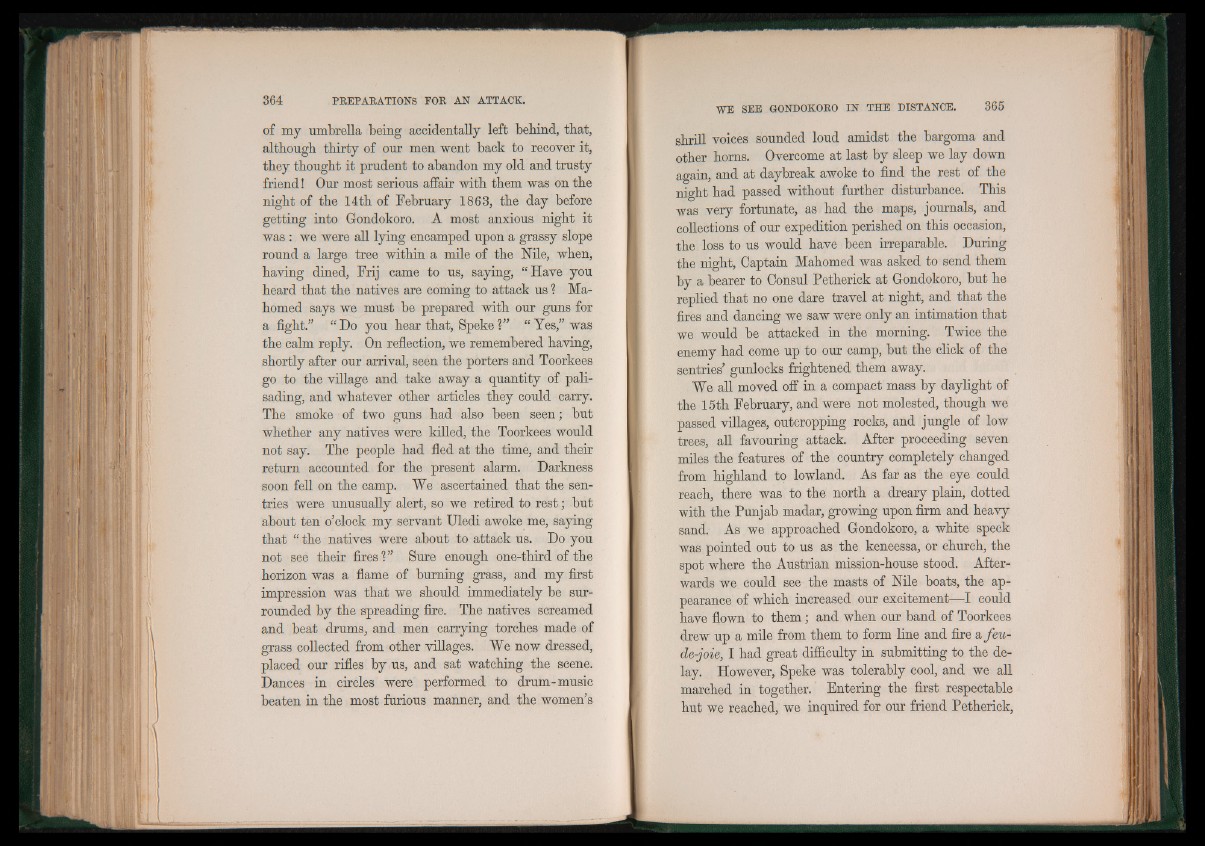
of my umbrella being accidentally left behind, that,
although thirty of our men went back to recover it,
they thought it prudent to abandon my old and trusty
friend! Our most serious affair with them was on the
night of the 14th of February 1863, the day before
getting into Gondokoro. A most anxious night it
was : we were all lying encamped upon a grassy slope
round a large tree within a mile of the Nile, when,
having dined, Frij came to us, saying, “Have you
heard that the natives are coming to attack us ? Mahomed
says we must be prepared with our guns for
a fight.” “ Do you hear that, Speke ?” “ Yes,” was
the calm reply. On reflection, we remembered having,
shortly after our arrival, seen the porters and Toorkees
go to the village and take away a quantity of palisading,
and whatever other articles they could carry.
The smoke of two guns had also been seen; but
whether any natives were killed, the Toorkees would
not say. The people had fled at the time, and their
return accounted for the present alarm. Darkness
soon fell on the camp. We ascertained that the sentries
were unusually alert, so we retired to rest; but
about ten o’clock my servant Uledi awoke me, saying
that “ the natives were about to attack us. Do you
not see their fires ?” Sure enough one-third of the
horizon was a flame of burning grass, and my first
impression was that we should immediately be surrounded
by the spreading fire. The natives screamed
and beat drums, and men carrying torches made of
grass collected from other villages. We now dressed,
placed our rifles by us, and sat watching the scene.
Dances in circles were performed to drum-music
beaten in the most furious maimer, and the women’s
shrill voices sounded loud amidst the bargoma and
other horns. Overcome at last by sleep we lay down
again, and at daybreak awoke to find the rest of the
night had passed without further disturbance. This
was very fortunate, as had the maps, journals, and
collections of our expedition perished on this occasion,
the loss to us would have been irreparable. During
the night, Captain Mahomed was asked to send them
by a bearer to Consul Petherick at Gondokoro, but he
replied that no one dare travel at night, and that the
fires and dancing we saw were only an intimation that
we would be attacked in the morning. Twice the
enemy had come up to our camp, but the click of the
sentries’ gunlocks frightened them away.
We all moved off in a compact mass by daylight of
the 15th February, and were not molested, though we
passed villages, outcropping rocks, and jungle of low
trees, all favouring attack. After proceeding seven
miles the features of the country completely changed
from highland to lowland. As far as the eye could
reach, there was to the north a dreary plain, dotted
with the Punjab madar, growing upon firm and heavy
sand. As we approached Gondokoro, a white speck
was pointed out to us as the keneessa, or church, the
spot where the Austrian mission-house stood. Afterwards
we could see the masts of Nile boats, the appearance
of which increased our excitement—I could
have flown to them; and when our band of Toorkees
drew up a mile from them to form line and fire a feu-
de-joie, I had great difficulty in submitting to the delay.
However, Speke was tolerably cool, and we all
marched in together. Entering the first respectable
hut we reached, we inquired for our friend Petherick,